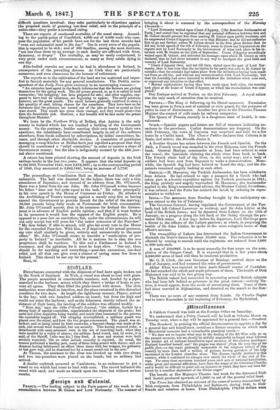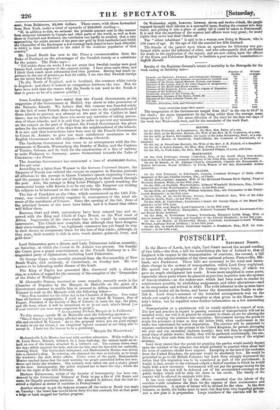IftlfsctIlaneous.
A Cabinet Council was held at the Foreign Office on Saturday.
We understand that a Privy Council will be held at Osborne House on Tuesday next, when a day will be appointed for a general fast.—Standard. The Standard, in praising the official determination to appoint a day for a general fast and humiliation, mentions a former occasion on which such a Ministerial measure had a remarkable practical result-
" We dare not to inquire what may be the dealing of the All-Wise with us on the present occasion, but we should be sinfully ungrateful to forget what followed the similar act of national humiliation upon occasion of the cholera pestilence: En land humbled herself, and the plague was stayed' from the very day of the fast,—a day made gloriously memorable in the religious history of this country by more than half a million of persons having partaken of the holy sacrament m the London churches alone. The disease rapidly declined in this country, while it continued its ravages over nearly the whole of the rest of Eu- rope. For more than seventeen hundred years such acts of national humiliation, under great and unusual afflictions, have been the usage of the Christian Church; and it would be difficult to point out an instance in which they have not been fol- lowed by a manifest abatement of the Divine anger."
The benefit at Her Majesty's Theatre last week for the distressed Irish and Scotch produced upwards of 1,3001. in aid of the general relief fund. The Times has obtained an account of the sums of money transmitted by Irish emigrants from Philadelphia and Baltimore, during 1846, to their friends and relatives at home. From Philadelphia, 170,150 dollars were
sent; from Baltimore, 28,500 dollars. These sums, with those forwarded from New York, make a total of upwards of 200,0001. sterling—
"If, in addition to this, we estimate the probable amount sent in like manner from emigrant labourers in Canada and other parts of the world, as well as from those in England and Scotland, the conclusion can hardly be avoided, that a sum approaching the entire amount of the poor-rate paid by Irish landlords (and which the Chancellor of the Exchequer a few eveningsUck stated to have been 390,0001. in 1846) is thus contributed to the relief of the destitute population of that country."
Mr. Lionel Booth has sent to the Times a communication from the Duke of Portland on the advantages of the Swedish turnip as a substitute for the potato. The Duke says-
" Till within these six weeks I was not aware that Swedish turnips were good human food, much superior to the common turnip. I have since eaten them, and I think them much more substantial food than potatoes. Having had much ex- perience in the use of potatoes as food for cattle, I am mire that Swedish turnips are the better food of the two."
[In the North of England, and in Scotland, the common white turnip is despised; and there is indeed no comparison between the two. But we have been told that the reason why the Swede is not used in the South is that it grows to be of a coarser quality.]
Some London papers have stated that the French Government, at the suggestion of the Government at Madrid, was about to take possession of the Balearic Islands. We believe that this rumour was founded solely OD the fact of some French ships having been sent to the neighbourhood of those islands to prevent any attempt on the part of the Carlists to land there; but we believe that there was never any intention of taking posses- sion of those islands; and it is said that, in order to prevent any uneasiness on the subject on the part of England, the French Government has given orders for the retirement of its ships from the neighbourhood of the islands. It is also said that instructions have been sent by the French Government to Count St. Aulaire, to give the most satisfactory assurances to the English Government on this subject—Morning Chronicle.
The Sardinian Government has come to an arrangement with the Go- vernments of Bavaria, Wurtemberg, the Dutchy of Baden, and the Cantons of Tessin, Grisons, and St. Gall, for the construction of a line of railway to unite Piedmont to Germany, across Switzerland towards the Lake of Constance.—La Presse.
The Austrian Government has contracted a loan of 40,000,000 florins, at five per cent. According to a letter from Warsaw in the German Universal Gazette, the Emperor of Russia has ordered the censors to suppress in Russian journals all allusions to the passage in Queen Victoria's speech respecting Cracow; and the passage is to be cut out of foreign journals in their transit through the post. Also, the passage in King Louis Philippe's speech touching the commercial treaty with Russia is to be cut out; the Emperor not wishing his subjects to be informed on the state of his foreign relations.
The fair of Frankfort on the Oder, which commenced on the 14th Feb- ruary, was rendered perfectly nugatory in consequence of the total ab- senoe of the merchants of Cracow. Since the opening of the fair, three of the principal houses of the town have failed, and it is feared that others will follow them.
Between 1841 and 1846, conventions have been entered into and re- newed with the King and Chiefs of Cape Mount, on the West coast of Africa. Suppression of the slave-trade was to be repaid by commercial intercourse. The Chiefs now complain, that although they have foregone their slave-trading profits, " no legitimate commerce has yet found its way to their shores, to compensate them for the loss of that trade; although, as they state, their country is rich in corn, wood, timber, palm-oil, ivory, and gold-dust."
Lord Palmerston gave a dinner, and Lady Palmerston held an assembly, on Saturday, at which the Count de St. Aulaire was present. On Sunday the Count gave a grand entertainment at the French Embassy to a dis- .tingnished party of diplomatists, including Lord Palmerston.
Sir George Gipps, who recently returned from the Governorship of New South Wales, died suddenly, at Canterbury, on Sunday last. He was known to be labouring under disease of the heart.
The King of Naples has presented Mrs. Gurwood with a diamond ring, as a token of regard for the memory of the compiler of the " Despatches of the Duke of Wellington."
M. Alexandre Dumas, incensed at some remarks recently made in the Chamber of Deputies by the Marquis de Maleville on the grant of a Government steamer to enable him to proceed to Africa, commissioned M. Viennet to wait on the Marquis with the following letter- " Sir—You insulted me the other day in the Chamber of Deputies. Free today from all business engagements, I send to on my friend M. Viennet, Peer of France, President of the Society of Men of Letters, to learn the day, the place, and the hour, where it will be incumbent on us to cut each other's throat [ou a vans conrient que noun nous couperons la gorge].
" ALEXANDER DUMAS, Marquis de la Pailleterie."
To this strange epistle M. de Maleville sent the following answer-
"Sir—I thank you for having afforded me the opportunity of seeing the agree- able and excellent M. Viennet. As to the proposal which you are good enough to make to cut my throat, I am chagrined beyond measure at not being able to accept it. I have not the honour to be a gentleman. " Marquis DE MALEYYLLE."
Mademoiselle Lola Montes has met with another adventure. While walking in St. Louis Street, Munich, followed by a large bull-dog, the animal made an at- tack on one of the horses attached to a brewer's car. The carman drove away the dog; which angered the lady, and she cut him over the face with her umbrella, drawing blood. The bystanders interposed, and Mademoiselle Montes was driven into a chemist's shop. In entering, she slammed the door so violently as to break the windows: the mob broke others. Under cover of the night, Mademoiselle Montes reached home; but the next morning the people assembled before her resi- dence and broke the windows. The military. were called out, and a sentry placed at the door. Subsequently, the police required her to leave the city; which she did on the night of the 21st February.
Madame Habnemann, widow of the founder of homompathy, has been con- demned by the Correctional Tribunal at Paris to pay a fine of 100 francs and costs, for illegally practising medicine. She pleaded in defence, that she had re- ceived a diploma as doctor of medicine in Pennsylvania!
Another attempt to get the Sphynx steamer off the rocks at Brook was made on Tuesday: the vessel was moved about forty-five feet seaward, but at that point a ledge or lank stopped her further progress. On Wednesday night, however, between eleven and twelve o'clock, the people engaged brought their labours to a successful issue, floating the steamer into deep water, and getting it into a place of safety till it could be taken to Portsmouth. It is said that the exertions of the seamen and officers were very great; for many nights they never had their clothes off.
The " oldest inhabitant " is said to be a woman now living in Moscow, who is 168 years of age. At the age of 122 she married her fifth husband.
The friends of the patient upon whom an operation for lithotomy was per- formed while under the influence of ether, and who subsequently died, attributed his death to the application of the vapour, and are now calling upon the officers of the Essex and Colchester Hospital to institute a post mortem examination.— Suffolk Herald.
Results of the Registrar-General's return of mortality in the Metropolis for the week ending on Saturday last—
Number of Winter deaths. average-
Zymotic (or Epidemic, Endemic, and Contagious) Diseases 162 .. - 183
Dropsy, Cancer, and other diseases of uncertain or variable seat 112 Diseases of the Brain, Spinal Marrow, Nerves, and Senses 172 ... 170 Diseases of the Lungs, and of the other Organs of Respiration 354 Diseases of the Heart and Blood-vessels 38 32 Diseases of the Stomach, Liver, and other Organs of Digestion 69 70 Diseases of the Kidneys, &c 12 8 Childbirth, diseases of the Uterus, &c. ... 12 12 Rheumatism, diseases of the Bones, Joints, &c. 14 7 Diseases of the Skin, Cellular Tissue, Ate. 4 2 Old Age 62 81 Violence, Privation, Cold, and Intemperance 23 30 — — Total (including unspecified causes) 1044 1068 The temperature of the thermometer ranged from 50.1° in the sun to 23.2° in the shade; the mean temperature by day being colder than the average mean temperature by 4.2°. The mean direction of the wind for the first two days of the week was West-south-west, and for the remainder of the week East.



























 Previous page
Previous page